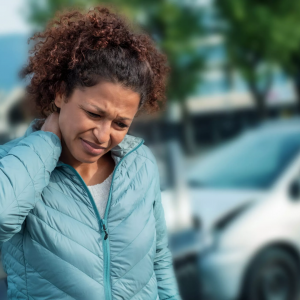
Motor Vehicle Accident
Motor vehicle accidents can cause a wide array of injuries, some of which are quite painful. Car accidents commonly cause injuries to the head, back, shoulders, neck, chest, legs, knees and arms.
Motor vehicle accident head injuries are particularly common. However, some head injuries suffered during auto accidents are minor while others are significant. Rapidly changing direction, suddenly stopping or a rear-end collision can lead to whiplash and/or a concussion. Concussions and even brain damage can occur when the tissue within the skull is damaged as a result of the head’s violent motion during an accident.
Back and neck injuries are especially common in motor vehicle accidents. Whiplash is an especially common injury to the neck. However, some neck and back injuries are merely mild strains. The force of the impact shapes the magnitude of the injury. If the force is significant, it will lead to a rupturing or herniation of the vertebrae in the spine, culminating in a herniated disc that presses on and inflames the spine’s nerves. The resulting severe pain can lead to reduced muscle control and even the loss of feeling.
Soft tissue injuries are also common in the aftermath of motor vehicle accidents. This injury to the soft tissue damages connective tissues such as the tendons, ligaments and muscles within the body. Soft tissue injuries range from muscle sprains to whiplash and general pain.
Chest injuries after motor vehicle accidents are usually bruises in which the skin is significantly discolored or contusions. Chest injuries can be quite severe and spur internal organ injuries and/or broken ribs. Drivers are especially likely to suffer chest injuries as they are positioned directly behind the hard steering wheel and column. There is also the potential for passengers to be flung forward during the collision, resulting in painful chest injuries.


Common Pains Following a Motor Vehicle Accident
Most people involved in auto accidents feel pain, albeit the intensity of that pain differs from one accident victim to the next. Pain resulting from an auto accident might not manifest for weeks. Examples of common pains that occur after motor vehicle accidents include headaches, neck/shoulder stiffness and pain, back pain, ab pain and even alterations in physical functionality.
Some car accident victims also display a change in their personality after the event. Such a change is indicative of a traumatic grain injury. Shoulder and neck stiffness and pain are especially common after side and rear-end collisions. Back pain after a car accident typically stems from injuries to the nerves, ligaments and muscles in the back. There is also the chance that back pain results from damage to the discs and vertebrae within the spine.
Low back pain is particularly common in those who have been in motor vehicle accidents. Also referred to as lumbar pain, lower back pain has the potential to be debilitating unless properly treated. Back strains arise quite frequently after such accidents, requiring weeks or possibly even months for the symptoms to fully manifest. Unless treated in a timely and thorough manner, back strains and other back injuries resulting from auto accidents can lead to long-term disability.

